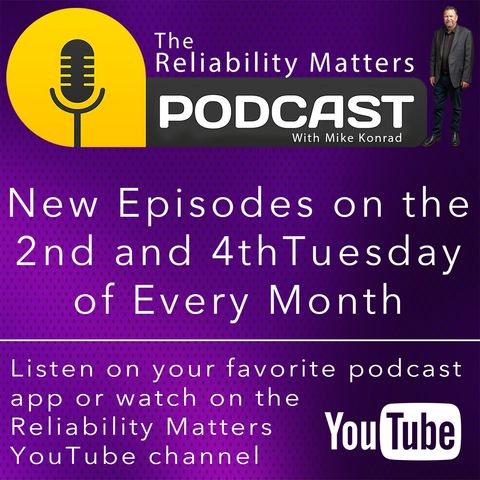
Contatti
Info
Reliability Matters is a podcast on the subject of reliability of circuit assemblies. Reliability "best practices" and success stories are discussed. This podcast features interviews with experts in the electronic...
mostra di piùAll electronic production segments which effect product reliability are on the table. This includes contamination, coating, cleanliness assessment, inspection, building for harsh environments, reflow, printing, failure analysis, board fabrication, and much more.
Your Host:
Mike Konrad began his career in the electronic assembly equipment industry in 1985. Mike founded Aqueous Technologies in 1992 in response to the Montreal Protocol and the resulting international treaty banning most popular cleaning/defluxing solvents.
Mike is an internationally known speaker on the subject of increasing reliability through contamination removal and cleanliness quantification techniques and procedures. Mike was awarded “Distinguish Speaker Status” with SMTA in 2018 and received the “Rich Freiberger Best of Conference Award” in 2019.
Mike is a member of the SMTA Global Board of Directors where he is Vice President of Communications. Mike is also Vice President of Technical Programs for the Los Angeles / Orange County SMTA Chapter.
Visit the Reliability Matters Podcast Website:
https://www.reliabilitymatterspodcast.com

Reliability Matters is a podcast on the subject of reliability of circuit assemblies. Reliability "best practices" and success stories are discussed. This podcast features interviews with experts in the electronic...
mostra di piùAll electronic production segments which effect product reliability are on the table. This includes contamination, coating, cleanliness assessment, inspection, building for harsh environments, reflow, printing, failure analysis, board fabrication, and much more.
Your Host:
Mike Konrad began his career in the electronic assembly equipment industry in 1985. Mike founded Aqueous Technologies in 1992 in response to the Montreal Protocol and the resulting international treaty banning most popular cleaning/defluxing solvents.
Mike is an internationally known speaker on the subject of increasing reliability through contamination removal and cleanliness quantification techniques and procedures. Mike was awarded “Distinguish Speaker Status” with SMTA in 2018 and received the “Rich Freiberger Best of Conference Award” in 2019.
Mike is a member of the SMTA Global Board of Directors where he is Vice President of Communications. Mike is also Vice President of Technical Programs for the Los Angeles / Orange County SMTA Chapter.
Visit the Reliability Matters Podcast Website:
https://www.reliabilitymatterspodcast.com
Informazioni
| Autore | Reliability Matters |
| Organizzazione | Reliability Matters |
| Categorie | Tecnologia , Istruzione , Notizie di tecnologia |
| Sito | www.spreaker.com |
| mike@mikekonrad.com |
Copyright 2024 - Spreaker Inc. an iHeartMedia Company
